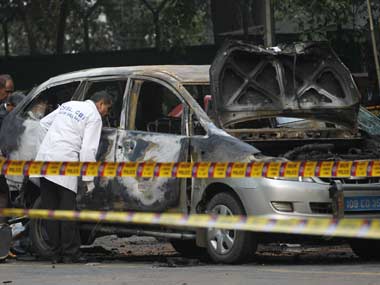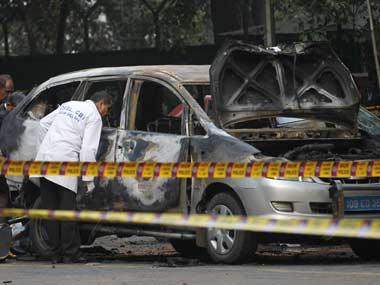Israel’s steadfast support for India’s own feeble efforts in combating terror at home, may be in jeopardy, if the Indian government rebuffs an Israeli effort to get the UN Security Council to condemn the car bombing of its embassy vehicle in New Delhi. Israel wants the Security Council to censure Iran, which it accuses of having been behind the attacks in Delhi, Bangkok (in Thailand) and Tbilisi (in Georgia), and has filed a formal complaint against Iran with the UN secretary-general Ban Ki-moon,
reports the Indian Express
. Israel’s ambassador to India, Alon Ushpiz, the report notes, met External Affairs Minister SM Krishna to seek India’s support for the resolution in the Security Council, where India is currently a non-permanent member. India has said it will consider the matter, but from all accounts it wants to shield Iran from being named in the resolution because, in its assessment, there is inadequate evidence to establish Iran’s culpability in the attacks. The matter puts India squarely at the centre of the proxy war being waged by Iran and Israel (and the US), and if India is even seen as unwilling to contemplate the possibility that Iranian security agencies may have been behind the bombing, it could put it in a spot. India has itself been in the same situation that Israel is in today: at home and elsewhere, most strikingly in Afghanistan, it has been targeted for terrorist attacks by Pakistan-backed groups or “non-state actors” which give their ISI-Pakistan military handlers enough deniability. India has itself faced much frustration in establishing the case that Pakistan has been behind such attacks. [caption id=“attachment_216646” align=“alignleft” width=“380” caption=“The car of the Israeli diplomat which was attached with a ‘sticky’ bomb in New Delhi. Israel accuses Iran of being behind the attack. AP”]
 [/caption] For India, therefore, to take this stand and refuse to even contemplate the possibility that Iranian security agencies may have ‘gone rogue’ and organised the Delhi attack risks jeopardising support for India’s ongoing (but feeble) effort establish Pakistani culpability in terror attacks. As
columnist Pratap Bhanu Mehta notes
, the discourse in India remains polarised between those who want to see India “stand up to” US (and Israeli) pressure and maintain ties with Iran, and those who want India to abandon Iran and take a “pro-American, pro-Israeli” stand. But both these strands oversimply the issue that confronts India. Seeing the conflict as one between the US and Iran ignores the geopolitics of the West Asian region – which pits Iran against the other Gulf states, which would like to see Iran constrained even more than the US wants to. As Mehta points out, while it is in India’s interest to defuse conflict, it should not remain blind to the complexities of geopolitics in the West Asian region. India, for now, appears to have locked itself into a position that puts it on the same side of Iran, blinds it to the power tussles within the Iranian establishment, and if anything accentuates its energy dependence on Iran. Such an unnuanced position puts India at risk of isolation when it needs allies in taking on jihadi violence at home and elsewhere.
[/caption] For India, therefore, to take this stand and refuse to even contemplate the possibility that Iranian security agencies may have ‘gone rogue’ and organised the Delhi attack risks jeopardising support for India’s ongoing (but feeble) effort establish Pakistani culpability in terror attacks. As
columnist Pratap Bhanu Mehta notes
, the discourse in India remains polarised between those who want to see India “stand up to” US (and Israeli) pressure and maintain ties with Iran, and those who want India to abandon Iran and take a “pro-American, pro-Israeli” stand. But both these strands oversimply the issue that confronts India. Seeing the conflict as one between the US and Iran ignores the geopolitics of the West Asian region – which pits Iran against the other Gulf states, which would like to see Iran constrained even more than the US wants to. As Mehta points out, while it is in India’s interest to defuse conflict, it should not remain blind to the complexities of geopolitics in the West Asian region. India, for now, appears to have locked itself into a position that puts it on the same side of Iran, blinds it to the power tussles within the Iranian establishment, and if anything accentuates its energy dependence on Iran. Such an unnuanced position puts India at risk of isolation when it needs allies in taking on jihadi violence at home and elsewhere.
How to lose friends and anti-terror allies: an Indian primer
FP Editors
• February 17, 2012, 14:28:47 IST
India has rebuffed Israel’s request for support for a UN Security Court censure of Iran over the Delhi car bomb attack. This is diplomatic folly.
Advertisement
)
End of Article